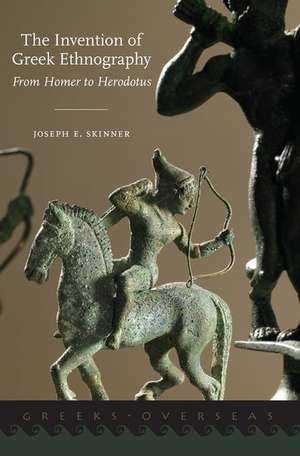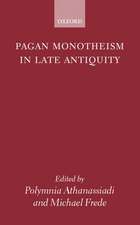The Invention of Greek Ethnography: From Homer to Herodotus: Greeks Overseas
Autor Joseph E. Skinneren Limba Engleză Paperback – 28 iul 2016
| Toate formatele și edițiile | Preț | Express |
|---|---|---|
| Paperback (1) | 335.01 lei 31-37 zile | |
| Oxford University Press – 28 iul 2016 | 335.01 lei 31-37 zile | |
| Hardback (1) | 687.73 lei 31-37 zile | |
| Oxford University Press – 27 sep 2012 | 687.73 lei 31-37 zile |
Preț: 335.01 lei
Preț vechi: 434.62 lei
-23% Nou
Puncte Express: 503
Preț estimativ în valută:
64.12€ • 69.68$ • 53.90£
64.12€ • 69.68$ • 53.90£
Carte tipărită la comandă
Livrare economică 09-15 aprilie
Preluare comenzi: 021 569.72.76
Specificații
ISBN-13: 9780190229184
ISBN-10: 0190229187
Pagini: 358
Ilustrații: 15 illustrations
Dimensiuni: 155 x 234 x 13 mm
Greutate: 0.52 kg
Editura: Oxford University Press
Colecția OUP USA
Seria Greeks Overseas
Locul publicării:New York, United States
ISBN-10: 0190229187
Pagini: 358
Ilustrații: 15 illustrations
Dimensiuni: 155 x 234 x 13 mm
Greutate: 0.52 kg
Editura: Oxford University Press
Colecția OUP USA
Seria Greeks Overseas
Locul publicării:New York, United States
Recenzii
The Invention of Greek Ethnography is a welcome addition to studies of identity in the ancient Mediterranean. Ambitious in scope and intelligent in execution, the book positions the question of ethnographic prose in the broad context of Mediterranean engagements with cultural identity, articulated in art historical and archaeological as well as literary sources.
This dense, well-written and documented book lives up to the formidable aim of providing fresh reappraisal of the origin of ethnographic literature in Greek as well as of the dynamics of interconnectivity between the Greeks and other peoples in the archaic Mediterranean world prior to the Persian Wars.
Skilflfully correlating numismatic, artistic, and archaeological evidence to reinforce
Skinner provides an expert critique on ancient ethnographic attitudes and modern preoccupations with ethnographical thought in ancient Greece. By combining literary analysis with discussion of the material evidence, Skinner shows how ethnographic interest was not invented in the fifth century; rather, our modern preoccupation with such an 'invention' is the result of 19th and 20th century developments in modern scholarship. His masterful analysis makes this book a pleasure to read.
Joseph Skinner convincingly demonstrates the extent and breadth (in visual media as well as in texts) of early ethnographical discourse in the intensely interactive and mobile world of the archaic Mediterranean. He encourages us to think in new and exciting ways about Herodotus, the history of our discipline, and Greekness itself.
Skinner's innovative and stimulating book thoughtfully analyzes an impressive range of material (vases, coins, texts, archaeological remains), and his central claim-that the Greeks were concerned with the 'Other' long before the formal genre of ethnography appeared-is convincingly demonstrated, and offers important insights into the development of Greek historiography.
[T]his is a book that should change what we say and what we teach about how Greeks thought about themselves and how they thought about others.
This dense, well-written and documented book lives up to the formidable aim of providing fresh reappraisal of the origin of ethnographic literature in Greek as well as of the dynamics of interconnectivity between the Greeks and other peoples in the archaic Mediterranean world prior to the Persian Wars.
Skilflfully correlating numismatic, artistic, and archaeological evidence to reinforce
Skinner provides an expert critique on ancient ethnographic attitudes and modern preoccupations with ethnographical thought in ancient Greece. By combining literary analysis with discussion of the material evidence, Skinner shows how ethnographic interest was not invented in the fifth century; rather, our modern preoccupation with such an 'invention' is the result of 19th and 20th century developments in modern scholarship. His masterful analysis makes this book a pleasure to read.
Joseph Skinner convincingly demonstrates the extent and breadth (in visual media as well as in texts) of early ethnographical discourse in the intensely interactive and mobile world of the archaic Mediterranean. He encourages us to think in new and exciting ways about Herodotus, the history of our discipline, and Greekness itself.
Skinner's innovative and stimulating book thoughtfully analyzes an impressive range of material (vases, coins, texts, archaeological remains), and his central claim-that the Greeks were concerned with the 'Other' long before the formal genre of ethnography appeared-is convincingly demonstrated, and offers important insights into the development of Greek historiography.
[T]his is a book that should change what we say and what we teach about how Greeks thought about themselves and how they thought about others.
Notă biografică
Joseph E. Skinner is Lecturer in Ancient Greek History at Newcastle University.



















